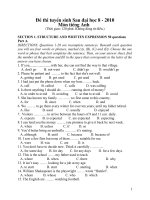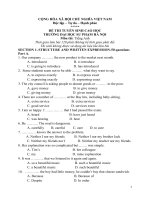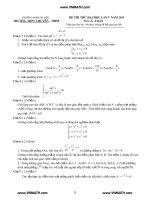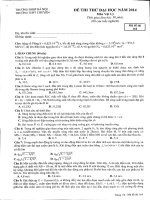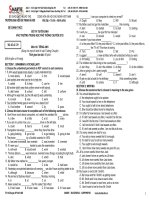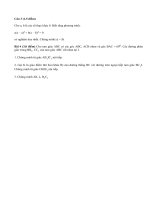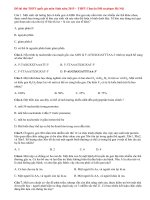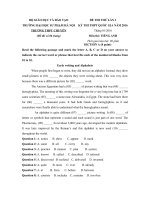Đề thi cao học tiếng anh 2011 TRƯỜNG ĐẠI HỌC SƯ PHẠM HÀ NỘI
Bạn đang xem bản rút gọn của tài liệu. Xem và tải ngay bản đầy đủ của tài liệu tại đây (136.24 KB, 11 trang )
CỘNG HÒA XÃ HỘI CHỦ NGHĨA VIỆT NAM
Độc lập – Tự do – Hạnh phúc
*****
ĐỀ THI TUYỂN SINH CAO HỌC
TRƯỜNG ĐẠI HỌC SƯ PHẠM HÀ NỘI
Môn thi: Tiếng Anh
Thời gian làm bài 120 phút (không kể thời gian phát đề)
Thí sinh không được sử dụng tài liệu khi làm bài
SECTION 1. STRUCTURE AND WRITTEN EXPRESSION-50 questions
Part A.
1. Our company ………. the new product to the market next month.
A. introduced B. is introduce
C. is going to introduce D. has introduced
2. Some students seem not to be able ……… what they want to say.
A. to express exactly B. to express exact
C. expressing exactly D. expressing exact
3. The city council is asking people to donate goods or ……… to the poor.
A. gave money B. to give money
C. giving money D. given money
4. There are a number of ……… at the Bay Inn, including baby-sitting.
A. extra service B. extra services
C. good service D. services extra
5. I am so happy. I …………… that I had passed the exam.
A. heard B. have just heard
C. was hearing D. hear
6. Be ………. The road is dangerous.
A. carefully B. careful C. care D. to care
7. ………… knows the answer to the problem.
A. Neither I nor my friends B. Neither I nor my brother Jack
C. Neither my friends nor I D. Neither my teacher nor my friends
8. Her explanation was so complicated but ……. was simple.
A. Tim’s B. her colleague
C. my D. mine explanation
9. It was ……… that we listened to it again and again.
A. so a beautiful music B. such a beautiful music
C. a beautiful music D. such beautiful
10. ………… the boy had little money, he couldn’t buy that cheese sandwich.
A. Because B. Because of
C. Despite D. In order
1
11. They came to the hall early good seats.
A. in order having B. so that to have
C. so as have D. so that they could have
12. The skyscraper, which is ………… , was first built in the USA.
A. tall buildings B. a tall building
C. tall building D. a building tall
13. A great number of big trees ………. in the rain forest.
A. live B. living
C. lived D. have lived
14. Before children can speak, ………. communicate with their faces.
A. he B. they C. them D. who
15. No competitor at the race is ……… David in computing.
A. faster than B. fast as C. faster D. fastest as
16. Producing is the process of ……… raw materials into useful products.
A. transform B. transforming
C. transformed D. to transform
17. I ……… my parents once a week.
A. use to phone B. used to phone
C. used phoning D. used to phoned
18. The wind was so strong …………put up our tent.
A. that we can not B. that could not
C. that we could not D. to
19. They couldn’t hear the speaker from where they were ……. his loud voice.
A. though B. despite
C. because D. because of
20. They couldn’t find the person ……………had supplied the information.
A. whom B. who
C. he D. whose
Part B.
21. In order to summit the report in time, he stayed up late to finish them.
A B C D
22. He never spoke to them again despite they sincerely apologized to him.
A B C D
23. There was such a terrible smell in the shed that we left immediate.
A B C D
24. She has so much work to do that she usually gets exhausted when she gets
A B C
home lately at night.
2
D
25. Most of the plays which were written by Shakespeare has been filmed.
A B C D
26. She said that the weather w ill not change much for the next 10 years.
A B C D
27. Turn a corner quickly is frightening to pedestrians.
A B C D
28. Warm, nourishment and protection enable the baby to survive and grow.
A B C D
29. Before w inning the war for independence in 1965, Algeria lost many of
their
A B C D
young men.
30. It was him who showed me the way to cross the swamp safely.
A B C D
31. Between you and I, we can talk free about what you think of the new
A B C D
Director.
32. I found a old composition of your s in the file in the shed.
A B C D
33. If I can do my homework, you were certainly able to do yours.
A B C D
34. Neither the dog nor the cats ha s their collar s on.
A B C D
35. Each year, tourists from all over the world travel to Poland to visit
A B C
a birthplace of Frederic Chopin.
D
36. Learn a new language is usually easier for children than for adults.
A B C D
37. Scientists could see little differen ce among the three drug.
A B C D
38. All of his paintings is so great that I don’t know which one to choose.
A B C D
39. Sarah didn’t attend the Botany lecture, and neither does George.
A B C D
3
40. Joe wish she had taken notes to prepare for the exam.
A B C D
41. You shouldn’t have left your luggage there without keeping an eye on them.
A B C D
42. No one can denied the fact that English is universally used.
A B C D
43. Could you show me how to type as quick as you do?
A B C D
44. The class felt sadly when they heard of their teacher’s accident.
A B C D
45. Please hold the rope tight. I am go to tie it now.
A B C D
46. The tile layer worked so hard that they were absolutely exhausted.
A B C D
47. At the height of the season, the rose smell sweet.
A B C D
48. When I was young I used be interested in both reading and writing.
A B C D
49. After her mother’s d ie , she, for the first time, knew what loneliness was.
A B C D
50. Slowly and cautious, the rescue workers pulled the boy to safety.
A B C D
SECTION 2. READING COMPREHENSION - 50 questions
Passage 1
We can communicate with other people in many different ways. We can talk,
write, and send messages. We use our hands and faces, the phone, the fax, and
email, television, film… to communicate.
Animals have ways of exchanging information, too. Bees dance and tell other
bees where to find food. Elephants make sounds that humans can't hear. But
what people can do is much greater. We have language, so we can write poetry,
tell jokes, make promises, tell the truth, or tell lies. And we have a sense of past
and future, not just present.
51. People can communicate with one another….
A. in one way B. only by using a language
C. in more than one way D. without any difficulty
52. Sending a message is a way ….
A. to communicate B. to show the difference in people
C. to practice writing D. to replace talking
4
53. Which one below is NOT listed in the passage as a means of communication?
A. our hands B. television
C. our legs D. the fax
54. How can a bee tell other bees where to find food?
A. by talking B. by dancing
C. by flying D. by using their faces
55. According to the information from the text, which statement below is NOT correct?
A. Bees can communicate in their own way.
B. People can not hear the sound that the elephant makes.
C. People are able to do fewer things than animals can.
D. People have a sense of future.
56. Look at the passage and decide which word below does not go with the verb ‘tell’
A. lies B. jokes C. poetry D. the truth
57. The word exchanging (line 4) is closest in meaning to …
A. giving and receiving B. writing out
C. sending D. communicating
Passage 2
Sugar cane was grown in India thousands of years ago. In Roman times it was
known in Europe as a great luxury, and it was very expensive for many
centuries after that. In 1493 Columbus took a sugar plant with him to the West
Indies where it grew so well that huge plantations were started by Europeans
there. Thousands of African slaves worked hard on them. The slaves were
shipped across the Atlantic on a journey which took six weeks. Many of them
died. The empty ships then carried the sugar back to Europe. So much money
was made that sugar was known as 'white gold'.
Sugar is used to sweeten food and make sweets and chocolate. By the 16
th
century the English were the greatest sugar-eaters in history. Elizabeth I lost all
her teeth because she ate so much of it.
58. Sugar cane has been known…
A. first in the West Indies B. for thousands of years
C. as a great luxury D. since 1493
59. Sugar was expensive …
A. only in Roman times B. in India
C. for African slaves D. for centuries
60. Who started huge plantations of sugar canes?
A. Columbus B. African slaves
C. the Indians D. the Europeans
61. All the statements below are correct EXCEPT
A. Sugar was a luxury in the past.
B. The first sugar plant was taken to the West Indies in the 15
th
century.
C. The land in the West Indies was very good for growing sugar cane.
D. The slaves were shipped from Europe.
5
62. The word it (line 4) refers to…
A. sugar plant B. Columbus
C. the West Indies D. a great luxury
63. The word there (line 5) refers to…
A. India B. the West Indies
C. Europe D. Rome
64. The word them (line 5) refers to…
A. Europeans B. plantations
C. African slaves D. ships
65. The word which (line 6) refers to…
A. the Atlantic B. a journey
C. six weeks D. African slaves
66. The word it (the last line) refers to…
A. food B. the English
C. history D. sugar
67. Which adjective below is related to ‘a great luxury’ in line 2?
A. expensive B. favorite
C. hard D. good
68. The word ‘shipped’ is similar in meaning to…
A. carried by plane B. carried by ships
C. sold to D. exported to
Passage 3
The new Hopewell Highway runs from Shenzhen to Guangzhou, and it
takes just two hours to do the 123 kilometers. This superhighway will become
the main street of a huge new city, the Pearl River City. It gets bigger and
bigger until the east meets the west, and the countryside in the middle
disappears under concrete.
There will of course be more and more cars on the road. People don't
want bicycles. If you have a car, it means you have made money. So the traffic
will be like in Bangkok, where people spend four hours commuting every day.
People eat and work in their car.
When finished, the Pearl River City will probably be the greatest city on
earth. It won’t be beautiful, but its power, energy, and wealth will be felt in all
corners of the world.
69. Read the first paragraph of the passage and say which of the statements
below is NOT correct.
A. It takes two hours to go from Shenzhen to Guangzhou.
B. The name of the city is Hopewell.
C. It’s over one hundred kilometers from Shenzhen to Guangzhou.
D. The countryside will disappear.
6
70. Hopewell Highway…
A. is now the main street of a huge new city.
B. is the name of a new city.
C. runs through Shenzhen.
D. is 123 kilometers long.
71. Which statement below is NOT correct according to the information from
the passage?
A. The number of cars on the road will go up.
B. The traffic on the road will be like in Bangkok.
C. Owning a car shows that you are successful.
D. People spend four hours commuting every day on Hopewell Highway.
72. The Pearl River City ‘won’t be beautiful, but its power, energy, and wealth
will be felt in all corners of the world.’ means…
A. the city is of great beauty.
B. the city can be seen from all corners of the world.
C. though not beautiful, the city will certainly be powerful.
D. People will visit the city because of its energy.
73. What does ‘It’ in line 3 stand for?
A. superhighway B. new city
C. Shenzhen D. Guangzhou
74. What does ‘where’ in line 7 stand for?
A. on the road B. in Bangkok
C. in their car D. the traffic
Passage 4.
In Hollywood, life can be difficult for children because everybody there wants
to be rich, famous and beautiful. Nobody wants to be old, poor and unknown.
Parents buy care and attention for their children because they do not have time
to give it themselves. They are not usually at home, so children have to decide
whether to make their own meals or go to restaurants, when to watch television
and when to do their homework. They organize their social lives. They play no
childhood games. They become adults before they are ready.
75. It can be… for children to live in Hollywood.
A. interesting B. rich
C. difficult D. poor
76. Which of the following statements is NOT correct according to the passage?
A. People in Hollywood want to be rich.
B. Everyone wishes to be famous.
C. Parents spend much time taking care of their children.
D. Parents are often away from home.
77. Which is NOT mentioned in the passage as children’s own decisions?
A. to make their own meals B. to watch television
C. to do their homework D. to travel to school by themselves
7
78. The following sentences are all true about children in Hollywood EXCEPT
A. Their parents buy care and attention for them.
B. They can organize their social lives.
C. They play childhood games.
D. They become grown up before they are ready.
79. The word “there” in the first line refers to…
A. all over the world B. In Hollywood
C. at home C. everywhere
80. The word “they” in line 3 refers to…
A. parents B. children
C. everyone D. unknown people
81. The word “They” in line 6 refers to…
A. Parents B. Children
C. Adults D. Famous people
Passage 5
Education in New Zealand is normally free for all primary, intermediate and
secondary schooling. However, most schools also ask for a "voluntary
donation" from parents, informally known as "school fees" or a "parental
contribution".
Primary and Secondary education is compulsory for students between the ages
of 6 and 16. Most students start at age 5 and move to intermediate school at 11,
then secondary school at age 13. So students may remain in school for the full
13 years.
There are three types of school: state, private (or registered or independent) and
state integrated schools. State and state integrated schools are government
funded. Private schools receive about 25% of their funding from the
government, and rely on tuition fees for the rest.
82. In New Zealand, it is normally free for students to attend…
A. primary school s B. intermediate schools
C. secondary schools D. all the three kinds of schools
83. The following phrases are alternatively used to name parents’ payment to
schools EXCEPT
A. compulsory fees B. voluntary donation
C. school fees D. parental contribution
84. According to the passage, which of the following statements is NOT true?
A. Primary and secondary education is compulsory.
B. Most students start school at the age of 5.
C. Some students can leave school at 13.
D. Students can remain in school for 13 years.
85. How long do most children stay in a primary school?
A. for 4 years B. for 6 years
C. for 8 years D. for 10 years
8
86. …… receive about 25% funding from the government.
A. State schools B. Private schools
C. State integrated schools D. No schools
87. Private schools are also called…
A. integrated schools B. registered schools
C. independent schools D. both B and C are correct
88. The word “compulsory” in the 2
nd
paragraph is closest in meaning to…
A. obligatory B. difficult C. right D. easy
89. The word “remain” in the 2
nd
paragraph is closest in meaning to…
A. leave B. stop C. stay D. have
90. The phrase “rely on” in the last paragraph is closest in meaning to…
A. depend on B. fund C. pay D. keep
Passage 6
The leaning tower of Pisa is famous not because of its beauty or size, but
because it leans dangerously to one side. Each year the tower attracts
thousands of visitors from all around the world.
The leaning tower is in the city of Pisa in Italy. It is 180 feet high and has 8
storeys. Work on building the tower began in 1174. First, a foundation of stones
was laid 20 meters deep. Then, the construction of the tower started. But it then
began to lean to the south. The work was stopped several times. The builders
tried to correct the tower's leaning but did not succeed.
Today the tower leans to the south and also curves towards the north. Over the
past years, various proposals have been made to stop the tower from leaning
further and to prevent its collapse. But until it is rebuilt or straightened, it will
remain as one of the most fascinating architectural mistakes in the world.
91. Thousands of people come to visit the leaning tower of Pisa because ……
A. it is old B. it is big and high
C. it is beautiful D. it is leaning
92. The leaning tower is…………….high.
A.180 feet B. 17 feet C. 20 meters D. 18 storeys
93. They started building the tower ….
A. in the early eleventh century B. in the late eleventh century
C. in the early twelfth century D. in the late twelfth century
94. The tower began to lean to the south…………….
A. in 1170 B. when it was being built
C. over the past hundred years D. after it was completed
9
95. According to the passage, all of the following statements are true EXCEPT
A. When the tower began to lean, the work was stopped several times.
B. Some work was taken to correct the tower’s leaning.
C. The builders succeeded in correcting the leaning.
D. A foundation of stones was laid deep.
96. Today the tower also curves…
A. to the south B. to the north
C. to the west D. to the east
97. The word “it” in line 2 refers to….
A. the leaning tower of Pisa B. Italy
C. the city of Pisa D. the building
98. The word “attracts” in the first paragraph is closest in meaning to…
A. appeals B. appears C. helps D. keeps
99. The word “various” in the last paragraph is closest in meaning to…
A. few B. small C. large D. many
100. The word “fascinating” in the last paragraph is closest in meaning to…
A. interesting B. boring C. famous D. strange
10
KEY ANSWER TO TEST PAPER 3-2011
Section 1-Part A Section 1-Part A Section 2 Section 2
1. C 21. D 51. C 76. C
2. A 22. C 52. A 77. D
3. B 23. D 53. C 78. C
4. B 24. D 54. B 79. B
5. A 25. D 55. C 80. A
6. B 26. B 56. C 81. B
7. B 27. A 57. A 82. D
8. A 28. A 58. B 83. A
9. B 29. D 59. D 84. B
10. A 30. A 60. D 85. B
11. D 31. B 61. D 86. B
12. B 32. B 62. A 87. D
13. A 33. D 63. B 88. A
14. B 34. D 64. B 89. C
15. A 35. D 65. B 90. A
16. B 36. A 66. D 91. D
17. B 37. D 67. A 92. A
18. C 38. B 68. B 93. B
19. D 39. D 69. B 94. B
20. B 40. A 70. D 95. C
41. D 71. C 96. B
42. B 72. C 97. A
43. C 73. A 98. A
44. A 74. B 99. D
45. C 75. C 100. A
46. A
47. C
48. B
49. B
50. A
11
